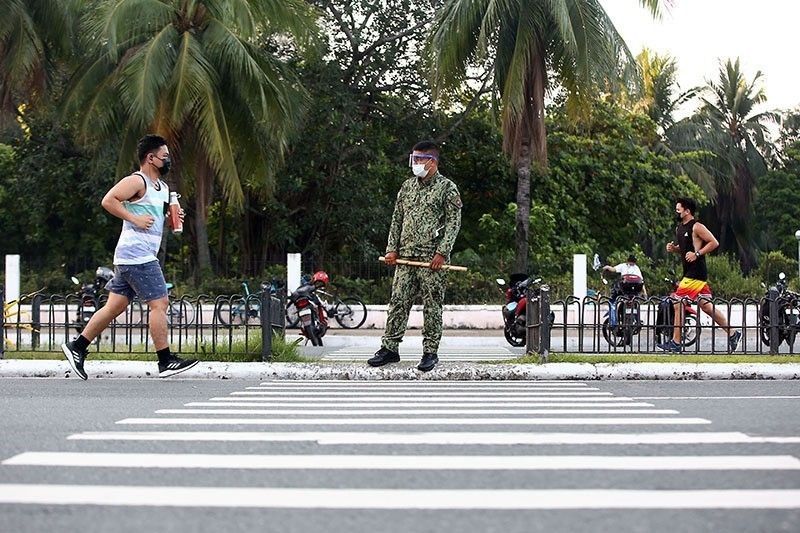Metro Manila mayors ban outdoor exercise during ECQ

MANILA, Philippines — Outdoor exercise is not allowed while Metro Manila is under the strictest enhanced community quarantine (ECQ,) the Metro Manila Council (MMC) said yesterday.
The MMC, composed of mayors of Metro Manila, issued Resolution 21-17, temporarily banning outdoor exercise until Aug. 20.
“While the MMC recognizes the need of the citizens to engage in various forms of outdoor exercise to promote and maintain physical, mental and emotional health, the council is also mindful of the fact that staying at home or remaining indoors is one of the best protection against the pandemic during the ECQ,” the resolution read.
The resolution cited data on the number of COVID cases in the past week, noting that the National Capital Region (NCR) experienced a steady rise in the number of cases.
This included confirmed cases of the highly-transmissible Delta variant.
The resolution was unanimously approved by all 17 mayors of Metro Manila.
At a press briefing yesterday, Metropolitan Manila Development Authority chairman Benhur Abalos said the order might be lifted on Aug. 20 if the number of COVID cases decreases.
Abalos said the total active cases in the region ballooned to almost 16,000 in recent days.
“Maybe, if the number of cases declines, we can lift this. It might just be for 10 days,” Abalos said in Filipino, referring to the resolution.
He reiterated the high transmission rate and character of the new variant, which prompted the council to ban outdoor exercise.
Meanwhile, Health Undersecretary Leopoldo Vega said the ECQ in Metro Manila could be relaxed if the number of infections decrease and more health facilities become available.
Vega said the average daily attack rate (ADAR) and two week growth rate in Metro Manila remain high while its health care utilization rate falls under moderate risk.
“We need to lower these, especially the two-week growth rate which has to become negative. Second, our ADAR should be lower so that the transmission won’t increase. Our HCUR (health care utilization rate) should also be at low risk, especially here in Metro Manila,” Vega said at a press briefing.
“If that happens, the IATF may deescalate the classification,” he added, referring to the Inter-Agency Task Force for the Management of Emerging Infectious Diseases.
Critical cases
The Department of Health reiterated its calls for hospitals to reserve their COVID beds for severe and critical cases.
Health Undersecretary Maria Rosario Vergeire said those suffering from severe and critical forms of COVID should be prioritized for hospital admissions.
“We still see hospitals admitting asymptomatic and mild cases. We encourage these hospitals to admit only the severe and critical cases,” Vergeire said in a television interview.
She said that asymptomatic and mild COVID cases should be navigated to the Level 1 facilities or temporary treatment and monitoring facilities.
“Expand more beds so that we can accommodate patients who will really need hospitalization. We need to be able to navigate patients,” Vergeire said.
The call was issued amid projections that active COVID cases would still increase by 18,000 by the end of September despite the implementation of ECQ in Metro Manila and other areas.
Vergeire said the DOH and the Department of Trade and Industry (DTI) are studying how to regulate the sale of oxygen tanks.
She said that DOH and DTI are coordinating with manufacturers so they can increase the production of oxygen tanks to ensure adequate supplies in hospitals.
In April, when the country was seeing spikes in cases, there was panic buying of oxygen tanks for household use.
The DOH warned that unsupervised use of oxygen could be harmful to health because having too much oxygen can affect breathing.
The government will also monitor the status of intensive care units in hospitals in Metro Manila and other areas under ECQ in the next few days before considering an extension of the hard lockdown.
Cabinet Secretary Karlo Nograles, co-chair of the IATF, said a “major factor” that could push for an ECQ extension is ICU beds, especially since the country is seeing a surge in COVID cases.
Nograles said that while the government has been preparing for the impact of the Delta and other variants of COVID, hospital bed capacities and oxygen manufacturing were ramped up.
He said medicine for severe COVID symptoms were also stockpiled.
Free ride
The Philippine National Police (PNP) rolled out free rides for APORs or authorized persons outside of residence in Metro Manila in the wake of the implementation of ECQ.
PNP chief Gen. Guillermo Eleazar said the free rides for workers would help offset the limited operation of public transportation due to the ECQ.
“This is the PNP’s way of reaching out to citizens by providing mobility and other extended services to authorized persons so they could attend to their work with convenience even while the ECQ is in effect,” Eleazar said in a statement.
Ten routes daily are from Metro Manila to nearby provinces and back from 5 a.m. to 9 a.m. and 5 p.m. to 9 p.m.
The free ride routes include Central Terminal (Manila City Hall) to Quezon Avenue MRT 3, Camp Crame to “Tungko” San Jose Del Monte Bulacan (via Commonwealth Ave.), Camp Crame to Rodriguez Rizal (via Litex), Camp Crame to Taytay (via Ortigas), Camp Crame to Meycauayan, Bulacan (via Mc Arthur Highway), Camp Crame to Antipolo City, Pasay to Monumento (EDSA) northbound, Monumento to Pasay Taft (EDSA) southbound, Camp Crame to Zapote in Bacoor, Cavite and Camp Crame to Novaliches.
Passengers have to present their identification cards as proof they are APORs before boarding.
Eleazar said passengers are also provided with face masks, bottled water and useful information materials.
Crisis action plan
The government has activated a stronger crisis action plan to stop the spread of COVID variants.
Defense Secretary and National Task Force against COVID chair Delfin Lorenzana said changes in the structure of Phase 4 of the National Action Plan compared to Phase 3 of the same are being adopted to focus on contingency measures.
Lorenzana said the crisis action plan would become the principal basis in preparing for or controlling the spread of the disease.
He said there will be community clusters whose mission is to prevent and detect, and health cluster to isolate and treat cases.
International borders will stop entry of travelers coming from countries with high COVID cases. – Alexis Romero, Sheila Crisostomo, Emmanuel Tupas, Neil Jayson Servallos, Michael Punongbayan
- Latest
- Trending






























